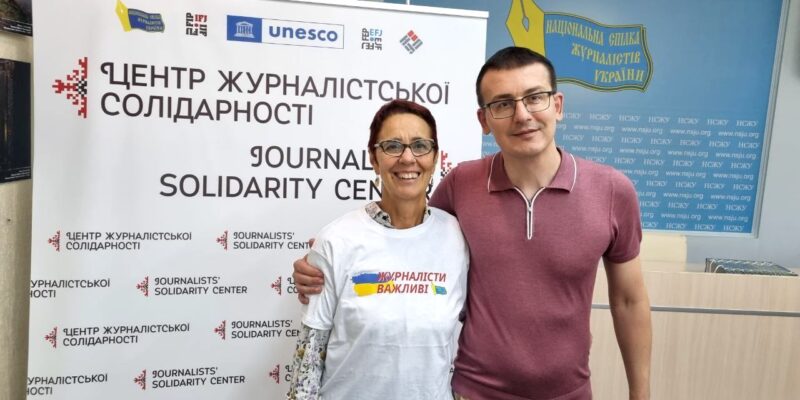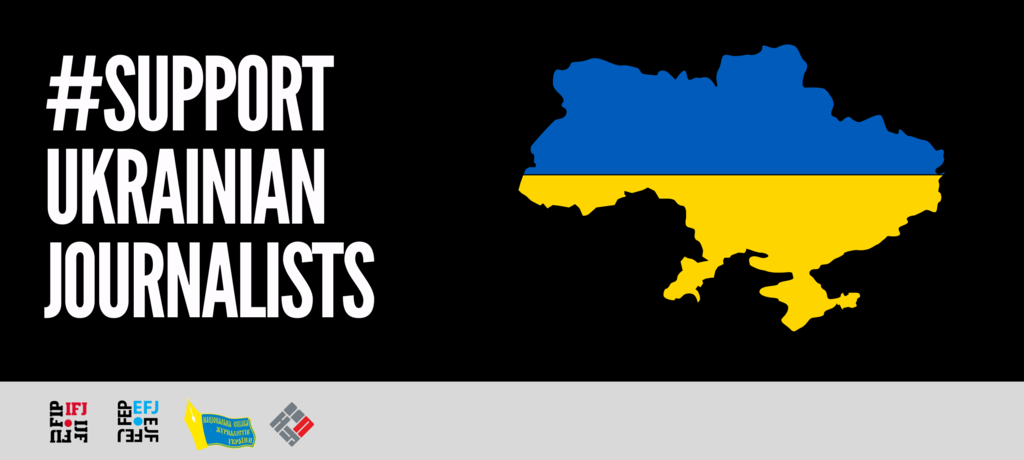Ukraine: “Thousands of Ukrainian journalists remain in the profession thanks to international journalistic solidarity”

As the war in Ukraine enters its third year, Sergiy Tomilenko, president of the National Union of Journalists of Ukraine (NUJU) and EFJ Steering Committee member reflects on two years of unwavering work and relentless determination to support journalists and media workers on the ground, with the help of international partners such as the International Federation of Journalists (IFJ), European Federation of Journalists (EFJ), and UNESCO. On 24 February, it will be two years since the war in Ukraine started and Tomilenko recalls the imperative need to raise more funds in a war that rages on, despite vanishing from the headlines.
It will soon be two years since the start of Russia’s full-scale invasion of Ukraine, which is ongoing despite disappearing from many international headlines. How is the situation on the ground, and how do you feel?
Unfortunately, that full-scale war, which in the first days of February 2022 seemed like a nightmare that should end in a few days or weeks, has now been going on for two years. We do not see any imminent prospects for its end despite the fact that the Ukrainian army heroically repels all Russian attacks. In these conditions, indeed, it is difficult for the world to maintain the focus of attention on this war for such a long time. Some talk about war fatigue, others say that media audiences want to consume more upbeat news..
At the same time, Ukrainian journalists, like the rest of Ukrainians, cannot close their eyes to what is happening, change the subject, or turn away from the truth of the war. To do so would mean coming to terms with aggression and losing. Hundreds of national and local media journalists have restructured their work and learned how to quickly cover emergencies related to Russian shelling, victims, and destruction of civilian infrastructure.
Of course, the most difficult security situation is in the regions bordering the front and the Russian border. Hundreds of journalists still live and work in these regions. I feel incredibly proud that the absolute majority of Ukrainian journalists, having a sense of professional duty and responsibility to the audience, make efforts to preserve their media – despite shelling, destruction, and the economic crisis caused by the war, most of them without any compromise regarding Russian propaganda.
What are the most pressing needs for journalists in Ukraine two years after the beginning of the full-scale Russian invasion of Ukraine?
The most urgent need is additional safety equipment – bulletproof vests, helmets, and tactical first-aid kits. The National Union of Journalists of Ukraine (NUJU) and our partners try to administer the free rental of such equipment, but it wears out over time.
Journalists also request psychological support. People lack the skills to relieve the war pressure. There is often no time left for recovery.
The war has destroyed the economy including the advertising market which has traditionally been a source of income for the media. Newsrooms lack financial resources, which leads to mass shutdown of publications. There is a lack of technical equipment, which often breaks down as a result of moving, shelling, and intensive exploitation, and it cannot always be repaired. Media most affected are local publications, which worked brilliantly in the first months after the invasion are now looking for long-term grant assistance.
What has your union been doing to help its members? Please provide concrete examples
NUJUhas provided the absolute majority of services not only to our members, but also to media workers and newsrooms in general. It includes safety and emergency first-aid training, emergency grants to colleagues who are in trouble (injured, lost housing or property), and rental of safety equipment. We are also happy to see media workers who have recovered from emergencies and received support from the Union, decide to join the ranks of the NUJU.
During the war, we have identified assistance to our regional branches as a priority, including those that, before the war, operated in the territories that are now fully or partially occupied by Russia, in particular in the regions of Kherson, Donetsk, Luhansk, Kharkiv, and Zaporizhzhya, as well as Crimea. Our activities are limited over there due to the situation. We have provided support to journalists, helped build partnerships with other regional organisations, obtained and renewed trade union membership cards, and developed a program of access to education services. We need more financial support for these regions. .
A new Solidarity Center for Journalists, launched by NUJU with IFJ, EFJ, and UNESCO support, opened in December in Kharkiv. Can you explain why the network of Journalists’ Solidarity Centers is crucial for journalists? (Can you provide us with quotes from journalists who have used the JSC to illustrate why they are necessary?)
NUJU is grateful to our international partners for supporting our initiative to create the network of Journalists’ Solidarity Centers in April 2022.
It consists of a network of five small offices – in Lviv (with a presence in Chernivtsi), Ivano-Frankivsk, Zaporizhzhia, Dnipro, and Kharkiv, as well as the headquarters in Kyiv. This is an alternative to the “hotline” for providing the necessary services to help journalists who are in trouble or are overcoming extraordinary professional challenges while working in dangerous conditions.
We advise on evacuation and rescue from occupied and dangerous territories, provide immediate financial support and technical assistance, conduct safety and first aid training events, provide psychological and legal support, and mentor support in improving and modernising the work of the media. In the front-line and de-occupied territories, where electricity and mobile communication are often absent, we managed to restore the print capability of thirty newspapers, which are often the only channel of information for the local population.
With the assistance of the Journalists’ Solidarity Centers, many colleagues decided to stay in the profession. They dared to transform their editorial practice and restructure it in accordance with modern requirements.
Their feedback can be a confirmation:
“The Journalists’ Solidarity Center is a real hub for journalists. Here, not only do we communicate professionally, but we also have material support. In particular, I have the opportunity to wear a helmet and a bulletproof vest, thanks to the Center. They gave us cameras. This is not only protection for a journalist but also helps in the restoration of our local newspapers,” – Svitlana Karpenko, editor-in-chief of the restored newspaper, Trudova Slava, from Orikhiv, Zaporizhzhia Region.”
Svitlana Karpenko, journalist at newspaper TRUDOVA SLAVA
“After the occupation of Kherson, we stayed in the city for a whole month. It was not possible to publish the newspaper, but we continued to fill the site until the occupiers started hunting journalists, which forced us to leave. The support of colleagues from the Journalists’ Solidarity Centers helped a lot. Legal support helped to correctly record the criminal actions of the occupiers, and colleagues from the Center helped to find housing. Today, the Journalists’ Solidarity Center provides us with a workplace and gives us protective equipment when we go on business trips,” said the editor-in-chief of the Novy Den newspaper from Kherson, Anatolii Zhupyna.”
Anatolii Zhupyna, journalist at newspaper NOVYI DEN
“At the Journalists’ Solidarity Center, I met colleagues who help journalists during wartime, when there is a threat to their work, and they suffer huge economic problems at their newsrooms.”
Anna Del Freo, FNSI Executive Committee member and EFJ Steering committee member
“I repeatedly turned to the Journalists’ Solidarity Center for help. During the blackout, you can work on some topics; you can get a bulletproof vest and a first-aid kit for a business trip to the front-line territory. Such help and support is very important,” said Oleh Baturin, a journalist who survived captivity during the occupation of Kherson.”
Oleh Baturin, journalist at newspaper NOVIY DEN
“Journalists in Kharkiv every day go to the sites of constant enemy artillery shelling of mostly civilian objects. The Journalists’ Solidarity Center in Kharkiv provides us with protective equipment and conducts security training. Effective cooperation with the Armed Forces of Ukraine is also being established at the Center. Recently, journalists met with the Deputy Commander of Khortytsia for strategic communications, Serhii Cherevatyi, at a Journalists’ Solidarity Center. After the meeting, the communication between journalists and the military improved significantly, and they agreed on further systematic work.”
Volodymyr Pavlov, journalist and fixer
How can unions and the journalistic community help Ukrainian journalists?
Thousands of Ukrainian journalists and hundreds of editors remain in the profession thanks to powerful international journalistic solidarity. Even in the first weeks of the full-scale invasion, leaders of journalist unions from Greece, Lithuania, Poland, Finland, Norway, and other countries gave us technical and financial assistance, studied the needs, and quickly ensured a response. The stability of our network of Journalists’ Solidarity Centersis ensured primarily thanks to this great international support.
Last year in Paris and Brussels, with the assistance of international colleagues, we held large photo exhibitions about the work of journalists during the war in Ukraine. These days, on the initiative of the Lithuanian Union of Journalists and the Belarusian Association of Journalists, such an exhibition is being presented in Vilnius. We expect that this year, our exhibition will be hosted in other European countries as well and we would welcome invitations from IFJ/EFJ members to help organise them. This will contribute to new discussions about the importance of further support for Ukraine, Ukrainians, and Ukrainian journalists and about the importance of professional journalism at the present time.
We also welcome any invitation to speak about the situation of journalists on the ground.
What message would you like to convey to affiliates and journalists on February 24?
A great thank you for the support that we, Ukrainian journalists, have received throughout these two years, as well as a big thanks to the media that sent journalists to Ukraine and to the freelance journalists who, through their work, draw attention to the war in the center of Europe and call for the adoption of democratic decisions to support Ukraine’s victory and the end of the war.
We thank you for your solidarity, declare our openness, and call for cooperation!
- Please donate to the IFJ/EFJ Safety Fund for Journalists in Ukraine to support Ukrainian journalists in need.
- For informationabout IFJ-EFJ work to support affiliates and journalists in Ukraine







